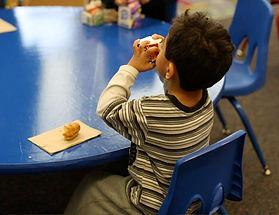
Breakfast After the Bell
Concerned Activists in the Community
Kids are the future of the world. So why is it that these children cannot even eat breakfast? How are they supposed to concentrate in class and soak up all of the knowledge necessary to, one day, command a nation? Breakfast is the most important meal of the day, so how is it that children who cannot fend for themselves are not being fed?
People may argue Breakfast after the Bell is not worth it because children who already qualify for free-or-reduced-lunches already have the opportunity to receive breakfast in cafeterias before the school bell rings. Well, that may be the case, but the important thing to remember here is that we are dealing with children and there may be many issues or complications that may cause them to not go grab a bite at the cafeteria. Any of these issues can range from the social stigma being on free-or-reduced-lunch can cause, to eating disorders, to even remembering that they are children and would rather stand around and socialize with their friends in the hallway.
“Since we started Breakfast after the Bell last September, teachers and administrators have commented repeatedly on the differences in the kids. They settle down faster and focus on their learning,” Sarah Martin, nutrition services manager for the Highline School District.
Another common question is: how much will this cost? Well, according to Sarah Levin, like the school lunch program, Breakfast after the Bell will leverage federal dollars — an estimated $9.6 million when the program reaches scale in three years. United Way and other private funders plan to raise money for start-up costs. State expenses would be minimal.
What is the problem? With minimal cost, our community can feed children!



According to a 2012 nationwide survey of K-8 teachers by Share Our Strength found that teachers credit breakfast with increased concentration (95%), better academic performance (89%) and better behavior in the classroom (73%). Additionally, students who eat breakfast consistently show improvement in verbal fluency, arithmetic, tests of attention, memory, creativity, physical endurance, and general tests of academic achievement and cognitive functioning.
Here are three ways that you can stand up and make your voice heard:
-
Form a parents group to spread awareness
-
Write letters to our local legislators
-
Find the local and national organizations combatting hunger in your own neighborhood, city, and state
*****Please help us in supporting Breakfast after the Bell*****

